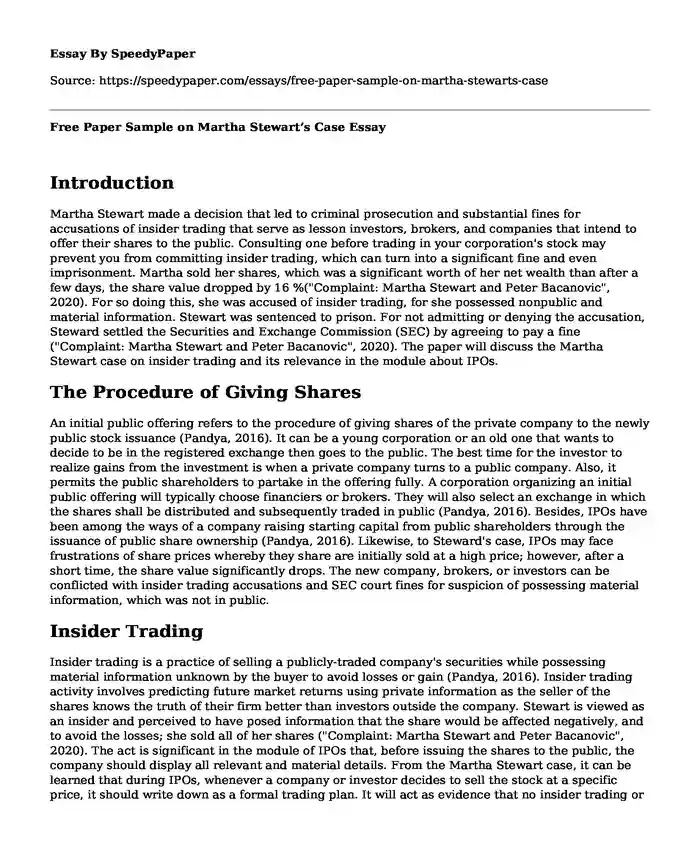Introduction
Martha Stewart made a decision that led to criminal prosecution and substantial fines for accusations of insider trading that serve as lesson investors, brokers, and companies that intend to offer their shares to the public. Consulting one before trading in your corporation's stock may prevent you from committing insider trading, which can turn into a significant fine and even imprisonment. Martha sold her shares, which was a significant worth of her net wealth than after a few days, the share value dropped by 16 %("Complaint: Martha Stewart and Peter Bacanovic", 2020). For so doing this, she was accused of insider trading, for she possessed nonpublic and material information. Stewart was sentenced to prison. For not admitting or denying the accusation, Steward settled the Securities and Exchange Commission (SEC) by agreeing to pay a fine ("Complaint: Martha Stewart and Peter Bacanovic", 2020). The paper will discuss the Martha Stewart case on insider trading and its relevance in the module about IPOs.
The Procedure of Giving Shares
An initial public offering refers to the procedure of giving shares of the private company to the newly public stock issuance (Pandya, 2016). It can be a young corporation or an old one that wants to decide to be in the registered exchange then goes to the public. The best time for the investor to realize gains from the investment is when a private company turns to a public company. Also, it permits the public shareholders to partake in the offering fully. A corporation organizing an initial public offering will typically choose financiers or brokers. They will also select an exchange in which the shares shall be distributed and subsequently traded in public (Pandya, 2016). Besides, IPOs have been among the ways of a company raising starting capital from public shareholders through the issuance of public share ownership (Pandya, 2016). Likewise, to Steward's case, IPOs may face frustrations of share prices whereby they share are initially sold at a high price; however, after a short time, the share value significantly drops. The new company, brokers, or investors can be conflicted with insider trading accusations and SEC court fines for suspicion of possessing material information, which was not in public.
Insider Trading
Insider trading is a practice of selling a publicly-traded company's securities while possessing material information unknown by the buyer to avoid losses or gain (Pandya, 2016). Insider trading activity involves predicting future market returns using private information as the seller of the shares knows the truth of their firm better than investors outside the company. Stewart is viewed as an insider and perceived to have posed information that the share would be affected negatively, and to avoid the losses; she sold all of her shares ("Complaint: Martha Stewart and Peter Bacanovic", 2020). The act is significant in the module of IPOs that, before issuing the shares to the public, the company should display all relevant and material details. From the Martha Stewart case, it can be learned that during IPOs, whenever a company or investor decides to sell the stock at a specific price, it should write down as a formal trading plan. It will act as evidence that no insider trading or business injustice happened in the initial public offering. However, the plan needs to be made when no confidential information is held about the company.
The other relevant of Martha's case to IPOs is choosing the right brokers. Steward's broker's Assistant revealed the trading intentions of Waksal and his daughter and influenced her decision to sell the shares in ImClone Company ("Complaint: Martha Stewart and Peter Bacanovic", 2020). A brokerage firm should not disclose the client's information to third parties. Therefore, when dealing with IPOs, it is essential to avoid brokers who are likely to give out confidential information. Revealing confidential aspects of the client's activities is against brokerage rules. Having confidential information passed by a broker is assumed by the SEC to impact the trading decision made, such as the price and value of IPOs ("Complaint: Martha Stewart and Peter Bacanovic", 2020).
Conclusion
In conclusion, during IPOs, a company or the investor face risks of `being accused of corporate malfeasance due to significant uncertainties happens to the stock (Pandya, 2016). It is hard to convince SEC that conspiracy and obstruction of justice did not happen in making IPOs decision. To avoid the significant fines and penalties or prison terms, a formal trading plan and selecting a confidential broker is vital.
References
Complaint: Martha Stewart and Peter Bacanovic. Sec.gov. (2020). https://www.sec.gov/litigation/complaints/comp18169.htm.
Pandya, F. H. (2016). After Market Pricing Performance of Initial Public Offerings (IPOs). Jindal Journal of Business Research, 5(1), 1-16. https://journals.sagepub.com/doi/abs/10.1177/2278682116670077
Cite this page
Free Paper Sample on Martha Stewart's Case . (2023, Oct 17). Retrieved from https://speedypaper.net/essays/free-paper-sample-on-martha-stewarts-case
Request Removal
If you are the original author of this essay and no longer wish to have it published on the SpeedyPaper website, please click below to request its removal:
- Free Essay with a Report of Internal Controls at Xavier's Pharmaceutical Company
- Issues Regarding Police Interaction with Minority Populations, Police Brutality Essay Sample
- Essay Sample on Ports and Intermodalism
- Essay Sample on Amendments and Constitutional Bill of Rights
- Essay Example: The Ever-Changing Financial Landscape and Job Security
- Parental Rights - Free Essay Sample
- Navigating Globalization: From Columbus to Cultural Dimensions - A Comprehensive Exploration
Popular categories





